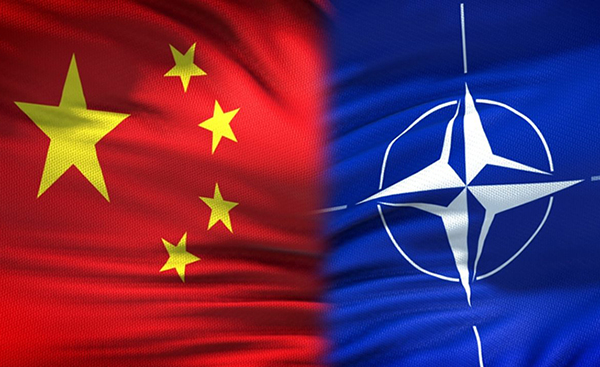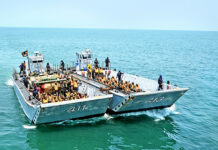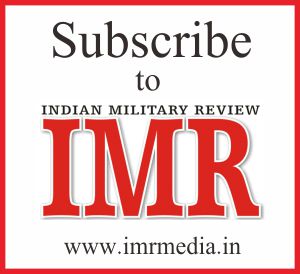

China’s continued disrespect for the sovereignty of its neighbours and aggressive conduct on the high seas has developed a deep security dilemma for neighbours who are carefully observing how NATO has been successful in at least preventing external threats for its members for over half a century now. China’s strategists should remain mindful that their belligerent actions are only pushing the yearning among a large number of countries to look for a similar but improved safety net in Asia. Its essential ingredients and early signs have only reinforced the debate further.
Unsavoury Advices
On 22 March, China sent unsavoury advice to the Philippines over its decision to further boost bilateral relations with the US. The reasons cited by Secretary Blinken while in Manila, was China’s “provocative actions” in the region, the US diplomat was confident that it would “promote peace and stability in the South China Sea.” These assertions were just too much for Xi’s strategists to swallow comfortably. Naturally, with growing tension in the regional waters particularly around the contested Spratly Island, China views this as an ‘unnecessary intervention’ from the US. China also felt unhappy with the news from Japan that it plans to convert its 16 seaports and airports into dual-use military infrastructure. Global Times in a commentary on 29th March termed the Japanese action as “Japan’s resurgence of militarism”. It appeared particularly infuriated that the new plans are actively promoted by the US in line with its Indo-Pacific strategy.


Not long back China had sent detailed advice on how Taiwan should plan and conduct its national election. In fact, it termed them as a regional election in its territory of Taiwan. From time to time, China has felt like advising many countries about their domestic policies. The list included major countries like Australia and India as well. Its ‘pearls’ of advice to India have special considerations about the conduct of diplomacy, foreign trade, state-to-state relations, multilateral military exercises, and of course, a list of restricted locations that must remain out of bounds in any case. China does not restrict its ‘advisories’ to comments from the Foreign Office but mostly it is pursued in great earnest by its state agencies and deeply controlled media.
ALSO READ: Chinese Influence Operations
The world has a great spectacle to witness the Chinese interference in the just concluded Taiwan national election where China pushed its state machinery to create a massive disinformation campaign discrediting the Democratic Progressive Party, the ruling alliance, and promoting its choice of candidates. It offered free trips to the mainland for a ‘better understanding’ of the perspective. When the election drew closer it even sent muffled threats to voters to ‘choose carefully’ as it imposed import restrictions under the garb of trade investigations.
In an aggressive show of strength, its fighters continue to breach the Median Line over the Taiwan Straits, once assumed as a sacrosanct air boundary between China and Taiwan. Its ships have dangerously attacked and blocked tiny Philippine boats with water cannons knocking them out of action on multiple occasions. It continues to send its ‘fishing boats’ further deeper into Senkaku Island raising alarms of territorial violation from the Japanese. Significantly, China conducts its affairs the way it desires, at the same time expecting everyone else to follow its directives. That’s being closest to how one can define the word hypocrites!
Raising Security Concerns
Countries in the neighbourhood of China not only feel threatened by its continued aggressive behaviour but are extremely worried about deteriorating future course. Japan’s National Security Council presented a very disturbing picture of the growing Chinese threat to Japan’s sovereignty. It was highlighted that with its current capacity, Japan would not be able to sustain a conflict with China. This strongly drove Japan to find a fix which was illustrated when they changed their national security outlook in December 2022 and dispensed with terms like Self Defence Force enshrined in Article 9 of their constitution. This was one of the reasons why Japan was so interested in getting NATO to set its foot there through a first-of-a-kind ‘Liaison Office’. Australia on the other hand was another major neutral power which decided it was time to ‘change course’. It boosted its defence investments, critically planned to adopt new platforms like nuclear submarines and almost rushed into the security grouping of AUKUS along with the UK and the US.
Deepening security concerns from China also took their toll on ASEAN. For the first time it decided to institute a dedicated commission for dialogue and discussion under the collective security approach for its members. Privately many ASEAN members have expressed alarming concerns over China’s hostile approach towards them. At one time ASEAN had entirely focussed on China to draw economic benefits, but the dramatic change in the situation demands credible management of security vulnerabilities with the same country. China has somehow been successful in creating a serious security quandary among almost all its neighbours. In global geopolitics unpredictability and unsavoury approaches are highly despised. It pushes countries further to find newer ways to preserve their sovereignty and dignity.
In such an unstable environment, countries joining hands in a promising formal security alliance is surely not out of context. If that happens, it will be a watershed moment for Asia and a point of no return. Xi’s chosen advisors may hurriedly dismiss such a scenario, and clearly, it is not an easy choice anyway. However, the perception is – they may be doomed if they choose and surely doomed if they don’t. It is a dark reality about China’s bloated ambitions and sadly for it, early signs of countries coming together have already begun to show!
Unmistakable Similarities
Existing home truths point to unmistakable similarities between Asian security challenges and what Europe was going through at the fag end of the Second World War. Noticeably, China is striving to get the aura of the erstwhile Soviet Union. In the near term, it wanted to be counted as ‘equal’ to the US while carrying a secret ambition of soon replacing it as the most powerful country in the world. The hanging fear of war among European nations at that time seemed replaced by a growing security threat among many Asian countries today. A pre-security alliance before NATO already existed in the form of the ‘Brussels Pact’, whose charter was to ensure “Collective Self-Defence” for its five members. Asia has already witnessed the formation of QUAD and AUKUS with a deep security undertone;
The US formed an integral part of NATO since its inception while it held special relations with the UK. In the Asian context, the US already maintains a strong presence both politically and militarily, while it holds special relations with Japan, South Korea and Taiwan. The Soviets have tried to strengthen their influence with Eastern Europe. China does not have that buffer but it has someone like North Korea which is much more powerful than maybe what Belarus is for Russia today. A formal alliance like NATO in Asia may not be imminent but it may also be just a ‘few events’ away.
Asian Security Alliance
If and when the deteriorating security environment dictates the formation of a formal alliance, say an ‘Asian Security Alliance’(ASA), the driving purpose would only be to ensure ‘collective security’ for its members. It would be undoubtedly looking for the NATO construct as an inspiration, especially the nuances of Article 5 and Article 10, which define the alliance’s commitment to security for its members and modalities for membership. However, it would also present an opportunity to incorporate measures ab initio which are seen as creating hurdles and conflict within NATO today. The existing ingredients definitely indicate that an ASA would probably be a reality sooner than later while being a much-improved version of NATO, offering better security resolutions.
NATO has served one great purpose – its members haven’t seen a major war for more than half a century. This will be one of the most important stimulations towards the formation of the ASA. However, ASA must look to ensure its actions are – ‘time relevant’, unlike NATO it must dispense with the condition of ‘unanimity’. It should be able to undertake timely preventive military action with say even a 2/3rd majority, while punitive military actions could be undertaken with a 3/4th majority. Such an arrangement would obviate a ‘decision dilemma’ within the organisation which at critical times could be purposefully induced by the prime adversary through the weakest link and prevent unanimity from ever coming across, eventually defeating the entire raison d’être of the alliance.
ALSO READ: China’s Cyber Ranges for Attack and Defence
The membership should remain ‘by invite’ and only for those who meet the strict requirements to which its members are supposed to commit especially funding and national military spending. To give strength to this multi-nation grouping, it may propose that each member must get into a bilateral security commitment as a prerequisite to join the grouping. First, it would remove the scope of conflict among members, and second, it would fully commit them in the time of need removing all scope of geopolitical influences. It would enhance every member’s confidence that their national security challenges will be addressed promptly and cannot keep waiting for phoney approvals from the UNSC or unanimity of views. Such security arrangements are probably becoming more relevant as the UN has become hostage to a select few who continue to stall popular action time and again by their veto. This would create a new powerful grouping taking its place as a major pole, simultaneously addressing the yearning for multipolarity in global affairs. It will considerably diminish the idea of the sole superpower and prevent the urge for global policing.
Global Realities
In the existing dynamics, the ASA appears much more capable of stabilising the security situation in the Asian theatre. It will allow every member irrespective of their size and potential to better commit its national resources for its people without ever having to worry about bullying by anyone. It will definitely not be against anyone and remain very attractive for everyone! The charter would make it possible for even Taiwan and China to be members simultaneously, as long as both commit to abide by the bilateral security commitment of ‘no war’ and coming to fully help the other in case of any threat. Those who would find it ‘uncomfortable to join’ will have no locus standi to criticise it, as the entry though conditional, is ‘not denied’ for anyone. The global realities have given one prominent message to all that practice of shadow boxing and cold war tactics only create greater complications, sucking in more and more resources. A plain-vanilla grouping is what addresses the problem, especially against wayward adversaries and unpredictable proxies. When the scale of reprisal and fear of suffering become obvious it would create invisible guard rails keeping lunatics on globally accepted behavioural norms. Pundits in China must be strategising their next move to have a greater destabilising impact upon their chosen adversary, but they must also remain watchful, their every act is only pushing the tiniest of countries to gain stronger resolve to stand up and guard their national pride. China may end up being the greatest contributor towards the creation of an eventual security alliance like ASA, without ever qualifying as a member of the same!


















